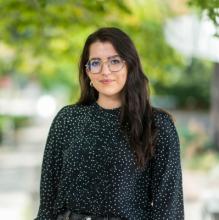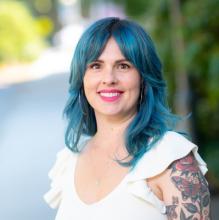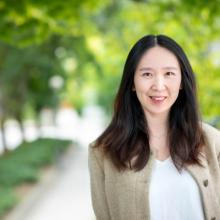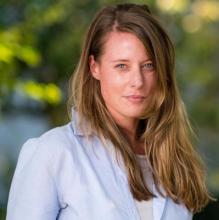My doctoral research involves partnering with local organizations to map the distribution of languages and documenting the lived experiences of migration, mobility, and settlement among marginalized language communities in the urban centres of New York City (NYC) and Kathmandu.
Research Description
My doctoral research involves partnering with local organizations to map the distribution of languages and documenting the lived experiences of migration, mobility, and settlement among marginalized language communities in the urban centres of New York City (NYC) and Kathmandu. Knowledge of where languages are spoken in these cities is critical for identifying social, political, and public health needs in linguistically minoritized communities and in order to advocate for inclusive and equitable language policies. The urgency of this work has become more apparent since the COVID-19 pandemic, which disproportionately impacted New York’s immigrant communities, revealing how existing inequities have been exacerbated by this crisis. Language mapping offers ways to explore how linguistic geographies intersect with health disparities and other social vulnerabilities as well as showcase the versatility and resilience of language communities through their own stories.
What does being a Public Scholar mean to you?
Public scholarship involves establishing partnerships in designing and implementing research. For me, public scholarship also entails a commitment to collaboration and to producing accessible and relevant products which contribute to public discourse and to creating a more just, equitable, and kind world.
In what ways do you think the PhD experience can be re-imagined with the Public Scholars Initiative?
The Public Scholars Initiative embraces, supports, and amplifies the important work being done by doctoral scholars at UBC who are invested in impactful, public-facing, and sometimes unconventional scholarship. Having the institutional support of the PSI enables doctoral students like myself to craft innovative and interdisciplinary research projects which focus on community engagement and public benefit. The PSI helps early career researchers imagine possibilities for research partnerships and career opportunities beyond traditional ideas of what it means to be in academia.
How do you envision connecting your PhD work with broader career possibilities?
Although this may change over time, I did not enter graduate school with the intention of pursuing a career in academia. I came to UBC to learn from those scholars who are invested in applied, community-based research and to engage with interdisciplinary methodological approaches that center justice for marginalized lives. I envision career paths which incorporate mapping in ways that provide a platform for linguistically minoritized communities to narrate their own lived experiences and draw attention to important data gaps that have contributed to their vulnerability. There are a number of organizations, individuals, and research efforts doing related work that offer exciting ideas of what’s possible, from Kathmandu Living Labs to Mapping Black Ecologies to Native Land.
How does your research engage with the larger community and social partners?
My research in NYC is part of a partnership which took shape before I became involved, between the Endangered Language Alliance (ELA), a NYC-based non-profit, and researchers from Dartmouth College and UBC, including my supervisor, Dr. Mark Turin. The language research and documentation represent a collaborative undertaking between linguists at ELA and community researchers from multiple language communities across the city. This collaboration offers a model for mutually beneficial partnerships between university- and community-based researchers united by common goals. As for Nepal, this is an exciting time to be engaging in language-based research. There is growing interest on the part of Nepal’s ethnolinguistic communities in sustaining their heritage languages, to which end the government has established a Language Commission and the Department of Linguistics has embarked upon a Linguistic Survey of Nepal. Through prior relationships established during my master’s research, and taking advantage of my supervisor’s experience and relationships built over decades of collaborative research in Nepal, I will partner with the Commission and the Department, as well as with Kathmandu Living Labs, a community-based mapping organization involved in multiple projects creating and distributing critical open data, such as in response to the devastating 2015 earthquake.
Why did you decide to pursue a graduate degree?
Between my master’s degree in geography and my enrollment in a PhD program in anthropology at UBC, I worked for many years as a GIS Analyst, creating, curating, and disseminating geographic information to the public. I also volunteered for and coordinated various humanitarian mapping efforts. My experiences using mapping to visualize and analyze data in order to inform the public and illuminate social disparities combined with my previous research interests examining the relationship between language and place propelled me to engage in a concerted way with mapping for linguistic justice. With a graduage degree in geography and many years professional experience in geographic information systems (GIS) under my belt, I wanted to critically engage with mapping as a methodology in order to address the invisibility of marginalized language communities, specifically in Nepal, also the site of my master’s research. I was interested in anthropology because of the reflexivity of the discipline, particularly in this moment and at UBC, and because of its embrace of an ethnographic approach to understanding lived experiences. Being a PhD student in anthropology at UBC affords me the opportunity to deeply engage with relevant scholarship, to encounter and learn from my peers, faculty, and multiple scholarly networks, and to articulate my path forward as a public scholar focused on language, mapping, and justice.
Why did you choose to come to British Columbia and study at UBC?
There is some overlap between my reasons for pursuing a graduate degree and why I decided to study at UBC. I had been following the work of Dr. Mark Turin, who is now my supervisor, for a number of years, beginning with an article of his which was the inspiration for my master’s research which explored the relationship between linguistic and biological diversity. I had the fortune to participate in a conference panel on language and politics for which Dr. Turin was the moderator several years ago, after which I began looking into UBC as a place to pursue my doctoral studies. I decided to apply to UBC for multiple reasons. I cherished the opportunity to work with Dr. Turin and Dr. Sara Shneiderman, who both have a long history of research and engagement in Nepal. I was excited to participate in the UBC Himalaya Program, which they formed along with other colleagues, by engaging with other scholars whose research is focused in the Himalaya. I was interested in learning from the value placed on community-engaged and applied research at UBC and by the work being done by departments such as Critical Indigenous Studies to center the voices of Indigenous communities in language revitalization efforts. And I was delighted to be able to incorporate my past academic and professional experiences to create an interdisciplinary research project rooted in anthropological sensibilities and methodologies.
The Public Scholars Initiative embraces, supports, and amplifies the important work being done by doctoral scholars at UBC who are invested in impactful, public-facing, and sometimes unconventional scholarship. Having the institutional support of the PSI enables doctoral students like myself to craft innovative and interdisciplinary research projects which focus on community engagement and public benefit.




